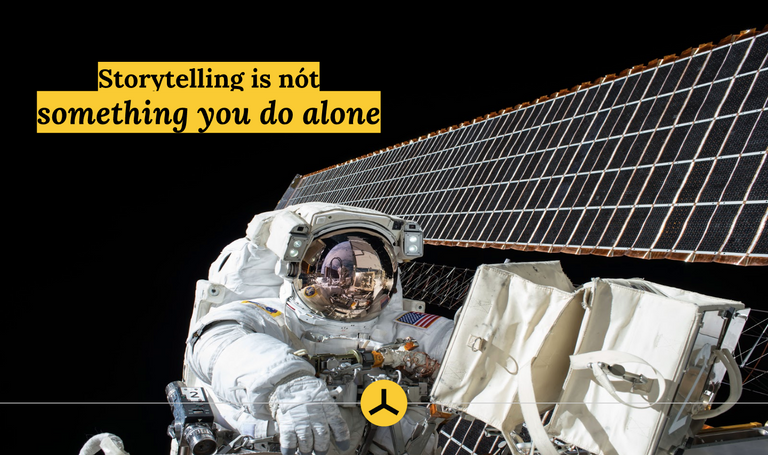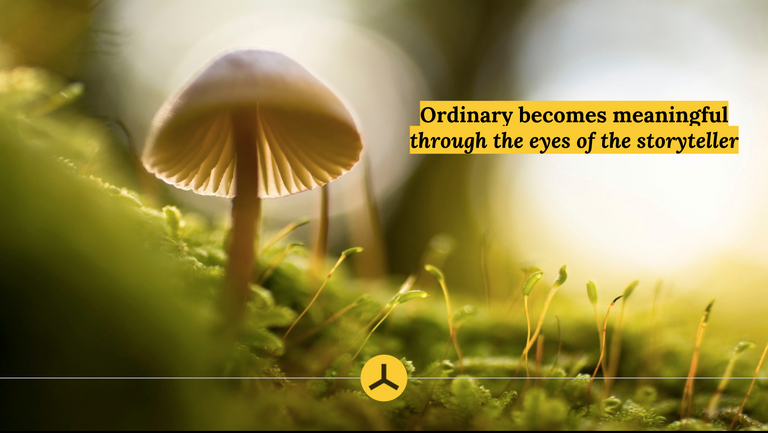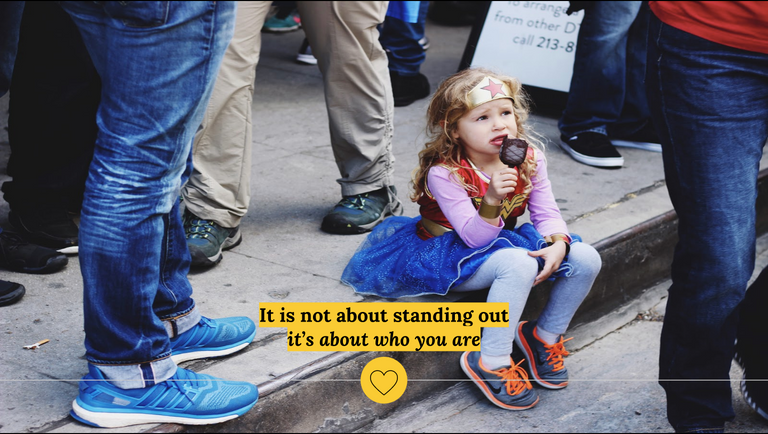
I am Ruben Blom, I am a storytelling practitioner based in Holland. In 2017 I switched my profession. From being a creative strategist I started a storytelling workshop and coaching business, named ROTYS. I take it as my mission to create more sensible storytellers in the world, since I believe they are needed for a better future for our world and our businesses. Here on Steemit I write about my startup journey and share my (sometimes quite different) view on storytelling in businesses today. Upvoting me funds my startup journey, so please do!
In this article I share a corner stone of my philosophy about the evolving storytelling industry (and why I believe my effort in my work has value). I give a quick overview of the lay of the land today, how we got here and where I see the storytelling industry evolve into.
Storytelling has become a broad term. I'm eager to hear what the status quo is about the topic in your region, but here in Western Europe storytelling can find a wide array of interpretations. Room for trouble to arise, because while you might look for storytelling, most offers offer storytelling which doesn't really help you with storytelling but only with storytelling. If you catch my drift...
What do you say when you say 'storytelling'?
The most narrow meaning of the word can be found where it originated: in the world of arts. Within this domain, storytelling is merely the collection of theories on how to craft a story. Subjects like dramaturgy, semiotics, stage direction and scenography (and lots more) help artists to construct stories in their medium of choice.
Storytelling, in this sense, isn't so much about an easy 9 or 12 step approach to fill out a storyline or can't-fail-delivery-techniques for keynote speakers and salesmen (to just name some of the broad interpretations of storytelling out there).
In arts, the knowledge domain storytelling reveals the 'psychology of the audience': it holds knowledge and methods to organize information like language and symbols in a way the human brain is most receptive for it. In other words: storytelling is about translating messages into a conceptual form so that the messaging is 'released' or 'found' by the audience in pretty much the way the storyteller has put them in the medium.

And then, one day, the elephant broke loose from the zoo. With rising competition over attention, marketeers and communicators throughout markets and industries were looking for a way to stand out. And storytelling is a great help when your job is to grab attention and put messaging in the hearts and minds of your audience.. uhh... target group. Over the last 10 to 15 years I've witnessed the storytelling industry develop wildly and rapidly, without any governance of standard. Today you can find storytellers of all sorts, crafting story for you in any medium you can think of. You can learn how to tell a story, even improvise them and you can get corporate journalists to write down your corporate story.
What does the industry tell you about storytelling?
About 95% of all offers advertise with the 'stickiness' of story in the receivers brain. They will tell you:
- Your audience will remember better
- They will be emotionally engaged
- It is the best way to make information accessible
- You will trigger action 2x faster, doubling your impact
And it is true. A good story will do that, and much more. Story has got this powerful competence to nestle in the receivers brain, influencing their behaviour (if they immerse in the story deep or often enough). A good story will create ambassadors of your story, enhancing its vertical spread greatly.
And yet I don't believe this market is fully grown up yet. Too many offers out there seem shallow or one dimensional. They will inspire you with storytelling, but I have a hard time believing they really, really get people what they need. Don't get me wrong, every person able to tell better stories adds to a better world. But this person was hoping for an approach to make his dream take place, and all he got was this lousy fairytale.

What does history tell you about storytelling?
Ashraf Ramzy, a friend of mine and a seasoned storytelling practitioner with over 30 years of experience, once told me: "I am not a storyteller. I can't seriously take on that role. Storytellers in ancient history were extremely skilled, wise men. They were responsible for the happiness and mindset of their people and they pointed the way into the future. They kept peace and triggered war. Storytellers received years of training and wouldn't see a real audience before all their hair was grey or gone. I know about storytelling, but I am not a storyteller."
When we think of storytelling, we tend to think about the story that we need to tell. More often than not a story is crafted for a single event, like a TEDx presentation or that big town hall meeting. If you're in it just the same, here's a friendly reminder: you aren't making theatre, you know? Throughout history storytelling was about sense making within a local or regional culture: a holistic, ongoing process of steering public opinion, rally masses and conservering knowledge and skill from generation to generation. What if I told you that you are competing with these kind of approaches? Would you bet on success with just one, single story?
What say academics about storytelling?
When we move on from the storytelling industry into the academic domain, where storytelling is settling in slowly by now, you notice this huge gap between the industry and the academics. Here, storytelling is more of a human, social trait. The academics look at storytelling as a continuous social process within any network of people. The 'sense making' process is being described and the impact of story on human behaviour and groups of people is studied. Academics seem to be less interested in crafted stories and focus on the naturally present process of communication and collaboration. Put differently: the thesis is we all tell stories, constantly. You can be good at it or terrible, and still you'll play your part. Just like you can not 'not communicate' you can also not 'not tell stories'.
When storytelling is done really right, it is a broad and holistic approach to direct the naturally present 'sense making' process within an organization or community. It is about enhancing pride that is already there. It is about keeping focus on the really important things. It is about inducing a common goal or getting everyone behind it. The so often branded communication traits of storytelling are merely a side effect of a social process which you might describe as perfect collaboration or strongly inherited cultural DNA. If you get your story straight within your culture, it will be (in) your brand ;)

What would you expect from the future of storytelling?
I started ROTYS based on my growing dissatisfaction with what the industry calls storytelling. On one hand you have all the different offers, all the practitioners who educate the world about storytelling. Together they carry out a pretty good storytelling process of framing the term towards their offer. But than you also have all the adversaries -almost shouting for a more realistic approach- the academic world ánd history. For years I didn't dare to identify my work with (what is often seen as) storytelling. But than one day, not too long ago, I realised I might as well strive to settle this misinterpretation and bring back the (truly) oldest trade in the history of mankind.
In the future, seen how ever so slowly the literature on this craft puts some weight in the scale for serious storytelling approaches, I anticipate that both demand and supply within the storytelling industry will shift more towards where it all started. You can already find companies who have storytellers in-house. You can find an offer or two which focusses on making teams aware of the story they act in (mine, for instance). Some agencies are wise enough not to come up with the story in the rebranding, but collecting it amongst the people who will be in it. We seem to become aware that our businesses are a part of the world just as well, and the people in it yearn for good, powerful sense making.
Eventually, I hope, the skill will play its ancient role of guiding people and cultures along their path to success throughout businesses and communities. Our world is already build upon amazing stories about mankind. I pray our future will be to.
Hey #whalepower, please review my work? This first article got buried under my noobness and I think it deserves a bit more stage.. :)
Great article! Can't wait for more. ReSteemed!
Congratulations @rubenblom! You have completed some achievement on Steemit and have been rewarded with new badge(s) :
Click on any badge to view your own Board of Honnor on SteemitBoard.
For more information about SteemitBoard, click here
If you no longer want to receive notifications, reply to this comment with the word
STOPBy upvoting this notification, you can help all Steemit users. Learn how here!